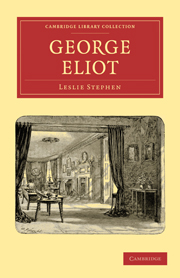Book contents
- Frontmatter
- Contents
- CHAPTER I EARLY LIFE
- CHAPTER II COVENTRY
- CHAPTER III “THE WESTMINSTER REVIEW”
- CHAPTER IV “SCENES OF CLERICAL LIFE”
- CHAPTER V “ADAM BEDE”
- CHAPTER VI “THE MILL ON THE FLOSS”
- CHAPTER VII “SILAS MARNER”
- CHAPTER VIII MIDDLE LIFE
- CHAPTER IX “ROMOLA”
- CHAPTER X “FELIX HOLT”
- CHAPTER XI “THE SPANISH GYPSY”
- CHAPTER XII “MIDDLEMARCH”
- CHAPTER XIII “DANIEL DERONDA”
- CHAPTER XIV CONCLUSION
- INDEX
CHAPTER X - “FELIX HOLT”
Published online by Cambridge University Press: 05 July 2011
- Frontmatter
- Contents
- CHAPTER I EARLY LIFE
- CHAPTER II COVENTRY
- CHAPTER III “THE WESTMINSTER REVIEW”
- CHAPTER IV “SCENES OF CLERICAL LIFE”
- CHAPTER V “ADAM BEDE”
- CHAPTER VI “THE MILL ON THE FLOSS”
- CHAPTER VII “SILAS MARNER”
- CHAPTER VIII MIDDLE LIFE
- CHAPTER IX “ROMOLA”
- CHAPTER X “FELIX HOLT”
- CHAPTER XI “THE SPANISH GYPSY”
- CHAPTER XII “MIDDLEMARCH”
- CHAPTER XIII “DANIEL DERONDA”
- CHAPTER XIV CONCLUSION
- INDEX
Summary
George Eliot had first become known as a writer (by “Amos Barton”) in January 1857. When the concluding part of Romola appeared within six years, she had reached the first rank among her contemporaries. She had published within that time five novels of the highest excellence, and it is at least doubtful whether she was ever again to reach an equally high mark. The effort had been very great, and for the next two years she seems to have allowed her mind to lie fallow. Then she took up a new book, of which I shall have to speak presently, although nothing was published until 1866. In November 1863 the Leweses settled at the Priory, 21 North Bank, Regent's Park. This house came to be especially associated with her memory. She did not go out into society; but many people were attracted by the fame of the great authoress, and found admission to her house. Gradually she came to hold a Sunday afternoon reception, frequented by worshippers of genius and by a large circle of friends, of whom only the more intimate had the privilege of seeing her upon other days. It is needless to say that at meetings of that kind—in England at least, for we are told that in France things are better—there is often a painful sense of awkwardness. The shyness generated by the desire to prove that your homage is genuine, and that you are so brilliant a person that it is also worth having, gives one of those painful sensations which is not least among the minor miseries of life.
- Type
- Chapter
- Information
- George Eliot , pp. 143 - 157Publisher: Cambridge University PressPrint publication year: 2010First published in: 1902



